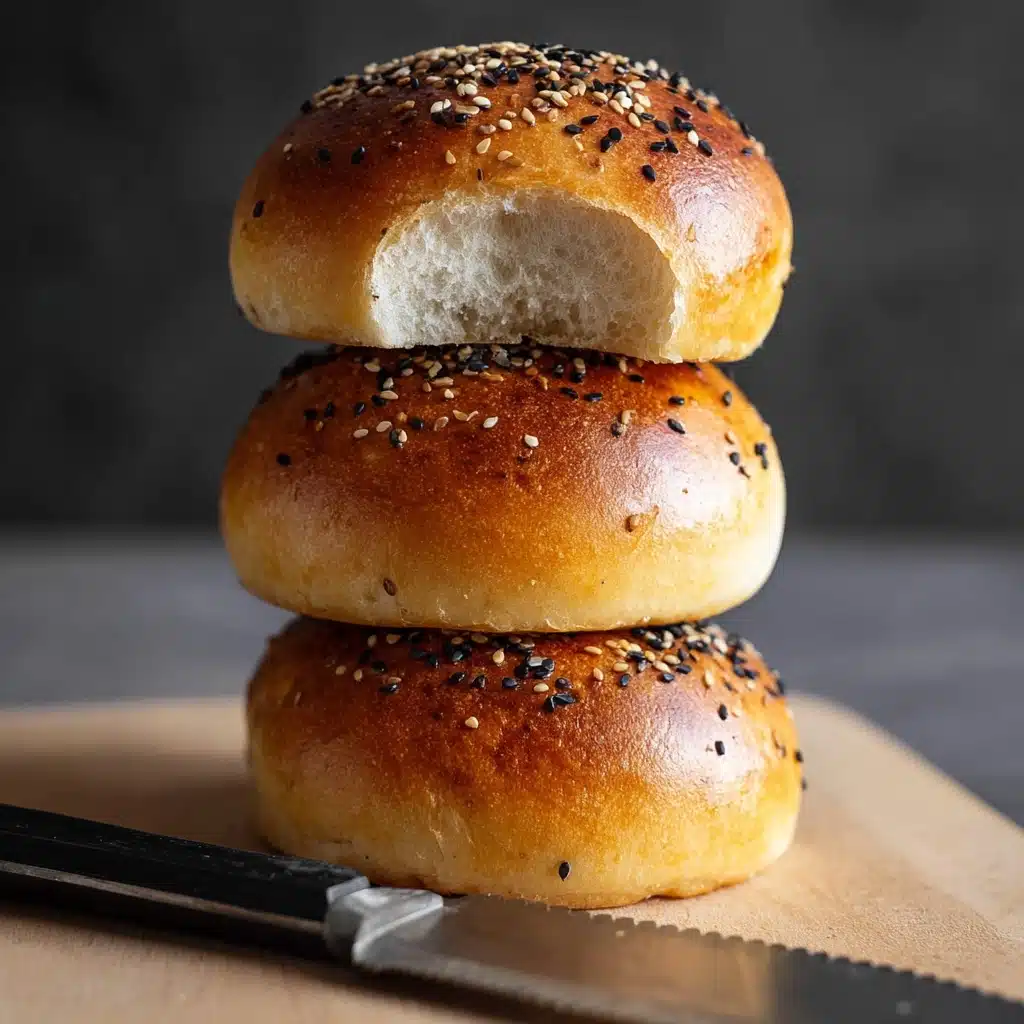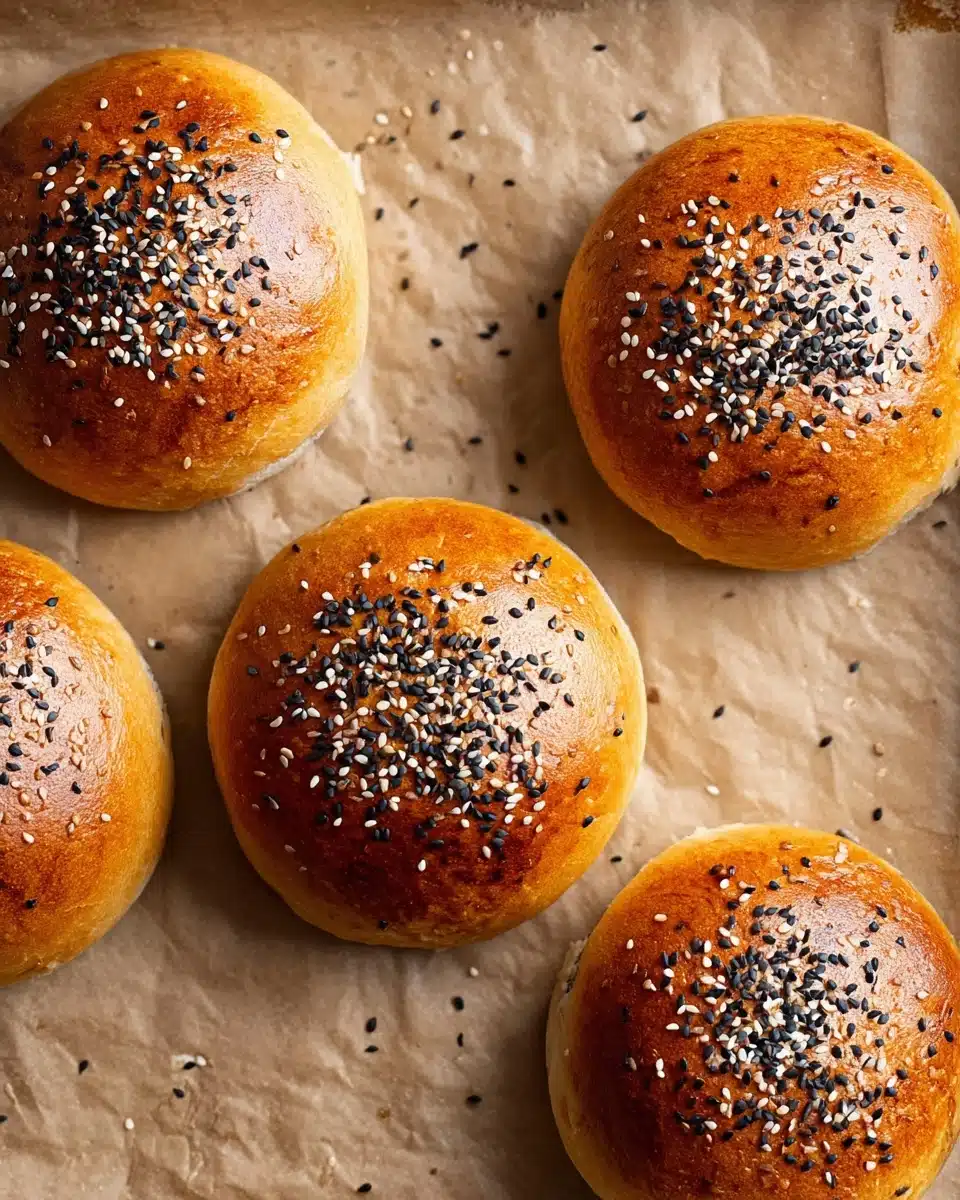Get ready to fall in love with Soft Sourdough Potato Buns—a heavenly marriage of pillowy, tender crumb and characterful tang, thanks to a secret ingredient: mashed potatoes. Whether you’re a sourdough devotee or just dipping your toes into homemade bread, these buns are guaranteed to upgrade any sandwich, burger, or dinner table. Their golden exterior gives way to a buttery-soft interior that stays delightfully fresh for days. Trust me, you’ll want to make a double batch!
Ingredients You’ll Need
Nearly every item in this list plays a pivotal role, from building structure to imparting complexity and softness. Don’t let the simplicity fool you: these basic building blocks work hand-in-hand to create buns with irresistible flavor, bounce, and color.
- Active sourdough starter: This bubbly ingredient delivers the sour tang and leavening essential to Soft Sourdough Potato Buns.
- Mashed potatoes (plain, cooled): The not-so-secret star, potatoes lend silkiness and moisture, keeping the buns extraordinarily soft.
- Bread flour: Its high protein content is key for strong gluten and fluffy buns that don’t collapse.
- Milk: Adds both richness and a slight sweetness—use whole milk if possible for the softest results.
- Unsalted butter: Melted butter brings a luxurious mouthfeel and helps the buns stay tender.
- Egg: This is your ticket to a golden crust and slightly airy, brioche-like crumb.
- Sugar: Just a bit helps round out the tang and deepen the color during baking.
- Salt: Essential for flavor balance and for supporting the right texture in the finished buns.
How to Make Soft Sourdough Potato Buns
Step 1: Prepare Your Mashed Potatoes
If you haven’t already, boil and mash a couple of floury potatoes (like russet or Yukon Gold) until completely smooth—lumps are the enemy! Let the mash cool to room temperature before incorporating. Cold or warm potatoes can make or break your dough’s rise.
Step 2: Mix Dough Ingredients
In a large bowl, combine your active sourdough starter with milk, egg, mashed potatoes, and sugar. Whisk thoroughly to dissolve everything before gradually stirring in the bread flour and salt. Continue mixing until a shaggy dough forms, then add the melted butter. Mixing the fat in last helps the gluten structure develop for perfectly airy, soft sourdough potato buns.
Step 3: Knead and Bulk Ferment
Knead until the dough is elastic and no longer sticky—this typically takes about 8 to 10 minutes by hand or half that time in a stand mixer. Once kneaded, place the dough in a lightly greased bowl, cover, and let it rise at room temperature for 4 to 6 hours. Expect the dough to rise by at least half. If your kitchen is chilly, don’t hesitate to extend the ferment a little longer—the depth of flavor is worth it!
Step 4: Shape the Buns
Turn your dough out onto a floured surface and gently deflate. Divide into equal portions (8 to 10 for burger-sized buns), then shape each into a taut ball by tucking the edges under. Arrange them on a parchment-lined baking sheet with enough space to expand. This is where Soft Sourdough Potato Buns start to take their signature form.
Step 5: Final Proof
Cover your shaped buns lightly with plastic wrap or a damp towel, and let them proof until they’re noticeably puffy—about 2 to 3 hours. They should jiggle gently when you nudge the pan. If you have time, a slow overnight proof in the fridge produces even more complex flavors and the softest texture imaginable.
Step 6: Bake the Buns
Preheat your oven to 375°F (190°C). For a glossy, deep-golden crust, gently brush each bun with beaten egg before baking. Pop the tray into the center of the oven and bake for 18 to 22 minutes, or until the Soft Sourdough Potato Buns are puffed, bronzed, and sound hollow when tapped on the bottom. Let them cool slightly before serving so their interior sets just right.
How to Serve Soft Sourdough Potato Buns

Garnishes
Take your Soft Sourdough Potato Buns over the top with a sprinkle of sesame or poppy seeds right after the egg wash, or brush them with a little extra melted butter and a scant pinch of flaky salt as soon as they’re out of the oven. For a special touch, a dusting of finely chopped chives or everything bagel seasoning is always a hit.
Side Dishes
Serve these tender buns alongside hearty soups, vibrant salads, or as a foundation for classic burgers—with all the fixings. They’re also wonderful with slow-cooked pulled pork, crispy fried chicken, or as a humble companion to creamy scrambled eggs for a knockout breakfast sandwich.
Creative Ways to Present
Turn mini-sized Soft Sourdough Potato Buns into adorable party sliders or fill them with egg salad and microgreens for afternoon tea treats. You can even hollow out slightly larger buns and use them as bread bowls for chili, stew, or cheesy dips—sure to wow any crowd!
Make Ahead and Storage
Storing Leftovers
Once completely cooled, keep your Soft Sourdough Potato Buns in an airtight container at room temperature for up to 3 days. They’ll stay tender and fresh longer than standard buns, thanks to the mashed potatoes.
Freezing
For longer storage, pop cooled buns into a freezer-safe bag, squeezing out as much air as possible. They freeze beautifully for up to 2 months—just thaw at room temperature when needed, and they’ll be as soft as the day they were baked.
Reheating
To revive leftover buns, wrap them in foil and warm in a 300°F (150°C) oven for 8 to 10 minutes, or microwave very briefly. This restores their pillowy texture and brings out that fresh-baked aroma all over again.
FAQs
Can I use leftover mashed potatoes?
Yes, as long as they’re not heavily seasoned or mixed with extra dairy—plain and cooled works best for achieving the lightest, fluffiest Soft Sourdough Potato Buns.
How can I make these buns vegan?
Swap the milk for your favorite plant-based milk, use vegan butter, and replace the egg with a flaxseed “egg” (1 tablespoon ground flaxseed mixed with 2.5 tablespoons water). The result is still soft and flavorful.
Why didn’t my buns rise much?
Rise issues are often due to an underactive starter or cold dough. Be sure your sourdough starter is bubbly and recently fed, and always ferment in a warm, draft-free spot for best results!
Can I make Soft Sourdough Potato Buns gluten-free?
While it’s a challenge to mimic the exact pillowy texture using gluten-free flour, you can experiment with high-quality gluten-free bread flour blends—just note that dough consistency and rising times will be different.
Should I use bread flour or all-purpose flour?
Bread flour is best for structure and chewy softness, but all-purpose flour works in a pinch. The buns may be slightly less lofty, but still incredibly tasty and tender.
Final Thoughts
If you crave bread that’s a little extra special, these Soft Sourdough Potato Buns are truly in a league of their own. Give them a whirl next time you want to wow your loved ones—once you taste that meltingly soft crumb, you’ll be hooked for life!
Print
Soft Sourdough Potato Buns Recipe
- Prep Time: 30 minutes
- Cook Time: 20 minutes
- Total Time: 7–10 hours (including fermentation)
- Yield: 8–10 buns
- Category: Bread
- Method: Baking
- Cuisine: American
- Diet: Vegetarian
Description
These ultra-soft buns combine tangy sourdough starter and creamy mashed potatoes to create a tender, fluffy texture that’s perfect for burgers, sandwiches, or simply slathered with butter.
Ingredients
- 1/2 cup active sourdough starter
- 3/4 cup mashed potatoes (plain, cooled)
- 2 1/2 cups bread flour
- 1/2 cup whole milk
- 2 tbsp unsalted butter, melted
- 1 large egg
- 1 tbsp sugar
- 1 tsp salt
- Optional: egg wash (1 beaten egg), sesame or poppy seeds for topping
Instructions
- In a bowl, whisk together the sourdough starter, milk, egg, mashed potatoes, and sugar until smooth.
- Stir in bread flour and salt until a shaggy dough forms. Mix in the melted butter last.
- Knead for 8–10 minutes by hand (or 4–5 minutes in a mixer) until dough is smooth and elastic.
- Place dough in a greased bowl, cover, and let rise at room temperature for 4–6 hours until puffy.
- Turn dough onto a floured surface, gently deflate, and divide into 8–10 pieces. Shape into balls and place on a parchment-lined baking sheet.
- Cover and proof for 2–3 hours at room temp (or overnight in the fridge) until soft and risen.
- Preheat oven to 375°F (190°C). Brush buns with egg wash and sprinkle with seeds if desired.
- Bake for 18–22 minutes until golden brown and hollow-sounding. Cool before serving.
Notes
- Brush with melted butter after baking for a glossy, soft finish.
- Store in an airtight container for 3 days, or freeze for up to 2 months.
- Use leftover plain mashed potatoes if unseasoned.









